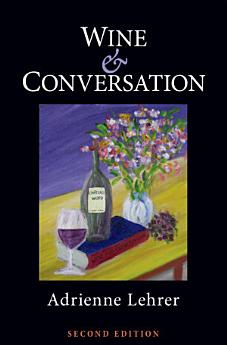Wine and Conversation: Edition 2
квіт. 2009 р. · Oxford University Press
Електронна книга
336
Сторінки
family_home
Можна додати
info
reportGoogle не перевіряє оцінки й відгуки. Докладніше.
Про цю електронну книгу
The vocabulary of wine is large and exceptionally vibrant -- from straight-forward descriptive words like "sweet" and "fragrant", colorful metaphors like "ostentatious" and "brash", to the more technical lexicon of biochemistry. The world of wine vocabulary is growing alongside the current popularity of wine itself, particularly as new words are employed by professional wine writers, who not only want to write interesting prose, but avoid repetition and cliché. The question is, what do these words mean? Can they actually reflect the objective characteristics of wine, and can two drinkers really use and understand these words in the same way? In this second edition of Wine and Conversation, linguist Adrienne Lehrer explores whether or not wine drinkers (both novices and experts) can in fact understand wine words in the same way. Her conclusion, based on experimental results, is no. Even though experts do somewhat better than novices in some experiments, they tend to do well only on wines on which they are carefully trained and/or with which they are very familiar. Does this mean that the elaborate language we use to describe wine is essentially a charade? Lehrer shows that although scientific wine writing requires a precise and shared use of language, drinking wine and talking about it in casual, informal setting with friends is different, and the conversational goals include social bonding as well as communicating information about the wine. Lehrer also shows how language innovation and language play, clearly seen in the names of new wines and wineries, as well as wine descriptors, is yet another influence on the burgeoning and sometimes whimsical world of wine vocabulary.
Про автора
Adrienne Lehrer is Professor of Linguistics (Emerita), University of Arizona. Lehrer has written on many aspects of lexical semantics: the structures of vocabularies and how words in a language are semantically related to one another. She has used wine descriptors and cooking words to test semantic theories. Recent woek has focused on creative neologisms, especially blends and the meaning of affixes.
Оцініть цю електронну книгу
Повідомте нас про свої враження.
Як читати
Смартфони та планшети
Установіть додаток Google Play Книги для Android і iPad або iPhone. Він автоматично синхронізується з вашим обліковим записом і дає змогу читати книги в режимах онлайн і офлайн, де б ви не були.
Портативні та настільні комп’ютери
Ви можете слухати аудіокниги, куплені в Google Play, у веб-переглядачі на комп’ютері.
eReader та інші пристрої
Щоб користуватися пристроями для читання електронних книг із технологією E-ink, наприклад Kobo, вам знадобиться завантажити файл і перенести його на відповідний пристрій. Докладні вказівки з перенесення файлів на підтримувані пристрої можна знайти в Довідковому центрі.





